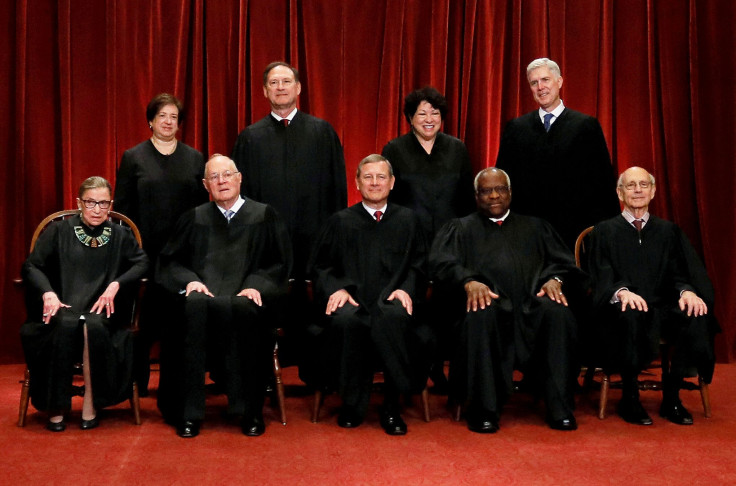Justice Anthony Kennedy's Retirement Rumors Surface; 4 Landmark Decisions By Supreme Court Justice

After serving the Supreme Court for nearly 30 years, Justice Anthony Kennedy, who would turn 81 next month, is rumored to be retiring from his post. As the Supreme Court entered its final week of work before a two-month long summer break, a decision is expected on the travel ban from President Donald Trump's administration, reports said.
Although, Kennedy has given no public indication of retiring this year, several of his former legal clerks have signaled to his considerations of stepping down in the next year or so. The rumors started when dozens of Kennedy's former clerks attended a reunion event this weekend, which was supposed to be held next year. Every five years, Kennedy holds a reunion for his clerks, the Associated Press reported.
One of Kennedy's former clerk, George Washington University law professor Orin Kerr, tweeted saying it will soon be confirmed whether Kennedy is retiring or not.
Soon we'll know if rumors of Kennedy's retirement are accurate, which makes this post on time limits timely again. https://t.co/Qw1hFJWAvC pic.twitter.com/NHMgtC0Ejx
— Orin Kerr (@OrinKerr) June 23, 2017
Read: Who Will Be Trump's Next Pick For Supreme Court After Anthony Kennedy?
Kerr tweeted again Saturday referring to his earlier tweet: "To be clear, I have zero inside knowledge about if Kennedy will retire. I was just noting speculation in tweet about case for term limits."
Kennedy was appointed by former President Ronald Reagan and is generally conservative. However, on some occasions, he has sided with liberals in some cases, such as his 2015 ruling in the nationwide same-sex marriage case which affirmed the Roe v. Wade abortion ruling in a 5-4 decision in 1992.
Kennedy's departure would give Trump the opportunity to appoint someone more conservative. Trump's conservative base rejoiced when the president picked Neil Gorsuch in April to replace the late Justice Antonin Scalia, reports said.
Kennedy is known for casting the vital swing vote in cases that grabbed national attention, which no other justice in recent history has done. We take a look at some of those cases.
1. Planned Parenthood v. Casey (1992)
A Supreme Court Case that challenged the constitutionality of many Pennsylvania state regulations dealing with abortion. The plurality opinion of the court upheld the constitutional right to have an abortion, but it also examined many restrictions of the right and upheld certain portions while invalidating others. Kennedy was a part of the plurality opinion which said the right to abortion was a fundamental part of the Fourteenth Amendment’s Due Process Clause.
2. Stenberg v. Carhart (2000)
A case that analyzed a Nebraska law that illegalized partial-birth abortion, except in the case when it would save the mother’s life. However, this law was struck down by the Supreme Court and they found it violated the Fourteenth Amendment’s Due Process Clause as interpreted in Roe v. Wade and Planned Parenthood v. Casey. However, Kennedy disagreed with the decision and claimed the law was allowed based on precedent in Planned Parenthood v. Casey because it allowed a certain extension of prenatal life preservation.
Read: John Roberts, Supreme Court Chief Justice, Will Swear In Trump At The Inauguration
3. Lawrence v. Texas (2003)
This was another landmark decision by Supreme Court that nullified a sodomy law in Texas by a 6-3 ruling. In a previous case, Bowers v. Hardwick (1986), the court upheld a Georgia statute and claimed there was no protection of sexual privacy in the constitution. However, this new ruling held that the Hardwick case looked at liberty interest "too narowly." The majority decision which had Kennedy's vote as well, stated intimate consensual sexual conduct was protected by the Fourteenth Amendment’s Due Process Clause.
4. Obergefell v. Hodges (2015)
After this decision, Kennedy was considered a hero of the liberals. Kennedy, through this ruling, cleared the way for same-sex marriage in 2015 which will likely be his most lasting legacy.
"They ask for equal dignity in the eyes of the law and the Constitution grants them that right," Kennedy had written in the judgment.
© Copyright IBTimes 2024. All rights reserved.






















